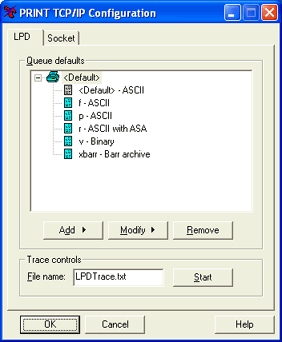
Use this tab to set up and maintain 4.3 BSD Acronym for Berkeley Software Development. LPD protocols. You can access this tab from the TCP/IP Configuration utility.
Closing the LPD tab by clicking OK, will automatically save all updated LPD information and refresh the LPD service. All connections to LPD after that point will use the updated information.
To view this tab, you must have the appropriate user access rights.
Click an option you want to learn more about.

Lists defined LPD print queues and their properties. A default queue is provided to process requests to unrecognized queues. If you delete the <Default> LPD queue, LPD will reject all requests to queues that are not listed on the LPD tab. A message will appear in the Operator Console stating the name of the requested queue and that the connection was refused. You can create a new default queue by adding a new queue named <Default> and assigning properties. See the Recreating the <Default> LPD queue topic for a list of the default properties.
Add button
Adds an LPD print queue and define its properties.
Modify button
Modifies the selected print queue. Select Queue Name to modify the rename the selected queue. Select Properties to display the File Properties dialog box where you can modify document attributes. Select Conversions to display the Input Conversion Utility where you can modify the type of files being sent using the Format tab and the Options tab.
Remove button
Deletes the selected LPD print queue or LPR command. By default, each queue contains a <Default> command. This command can be modified, but not removed.
Lists controls for capturing a trace of LPD data to be used for diagnostic purposes.
File name
Specifies the name of the trace file. The default name is LPDTrace.txt. The file will be saved in the Trace folder.
Start/Stop button
Starts and stops the trace. After you start the trace, the button label changes to Stop. The trace continues to record until you click Stop. Leaving the trace running can greatly degrade performance. The trace is intended as a diagnostic tool only and must not be used in production settings. If you close the TCP/IP Configuration utility while the trace is running, a message will ask you if you want to stop the trace.